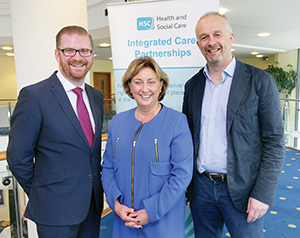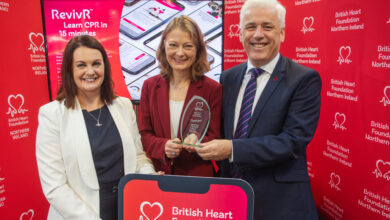Achieving a world class health service
Valerie Watts, Chief Executive of the Health and Social Care Board, discusses the challenges facing health and social care in Northern Ireland and how she is finding her first year in post.
Valerie Watts describes her first year in the role as chief executive of the Health and Social Care Board as both “fascinating” and “a steep learning curve.”
Since her appointment on 1 July 2014, John Compton’s replacement has been getting to grips with the challenges facing the sector. The Board commissions health and social care services for the region’s 1.8 million population and has an annual budget of around £4 billion. Services are then mainly delivered by the five geographic Health and Social Care Trusts, the Ambulance Service, GP practices, pharmacies and dental practices.
She admits: “Some people I work with don’t like me referring to it as a business, but from where I come from everything needs to be managed and I think of it as no different to any other business.”
In terms of her own personal development, she says pushing herself to learn about a whole new part of the public service has been “very good” for her. “I have managed to get a good grasp of the challenges that need to be tackled. They were very obvious after my first couple of months in post.”
Part of her time has been best spent “making introductions, getting to know key stakeholders, in the health and social care field in Northern Ireland, building those relationships and as well, giving opportunity to those people to get to know me a little bit better, what my working principles are, what I stand for and more importantly, what I won’t stand for.
“I can’t thank those people enough for their patience in sitting with me for long periods of time and talking to me about the current challenges in health and social care and helping me gain an understanding of how the Board can work with different parts of the system to help find combined or collective decisions to the total problems we’re facing into.”
Future vision
Watts describes it as “reassuring” that shortly after her taking up her post, Sir Liam Donaldson conducted his review of the health and social care system in Northern Ireland. It found the region’s health system as “likely to be no more or less safe than any other part of the United Kingdom, or indeed any comparable country globally.”
She highlights: “Sir Liam Donaldson’s concluding remark in his last recommendation was that Northern Ireland is perfectly sized [and] perfectly formed in terms of the population we serve where we have all the right conditions to make us the best in the world.
“That has become part of my mantra in terms of the job that I am here to do.” She admits, though, that Northern Ireland still has “a long way to go to achieve that objective.”
“What I would say on top of that is that I have been so impressed by the quality of the people that work in and across the system – the dedication to duty, the skills, the knowledge, the expertise, the motivation, the energy and the attitude that they bring to the job are second to none.
“There is a real dedication to duty and a real desire, I believe, to provide the best health and social care within the resources we have.”
Watts believes that now is the time to spell out to the people of Northern Ireland what the overall vision for a first class health and social care system could and should look like and then open up the debate to “let the public and politicians engage in that discussion about how we achieve that. That is going to lead to some intense local and political debates,” she notes.
Creating that vision is not to take away from Transforming Your Care, she stresses.
The major review of provision, which was commissioned in 2011, is for more care being provided in, or closer to home, supported by enhanced community and primary care services.
“Transforming Your Care is – and still remains – a very strong policy document and Donaldson himself commended the whole Transforming Your Care report in his review report. Indeed I think his words were: ‘It’s a really good roadmap, what’s stopping you getting on with it?’
“I suppose I have been a bit frustrated in my first year in the job, Transforming Your Care is a very solid plan, but because we were in a very difficult financial position, we couldn’t create a big enough funding pot to deliver the reform and transformation at pace and at scale last year.
“But we’ve had to regroup and refocus and indeed that is what we are doing within the current financial year to look at how we can free up and allocate appropriate resource to invest in that reform and transformation programme.”
One of the main aspects of achieving the vision is looking at the number of acute hospitals. Northern Ireland has 10 acute hospitals – a move to five to seven major acute networks has been proposed.
“Yes, we may have to stop providing some acute services in some hospitals but that’s not to say those buildings would close, they would be used for other purposes.”
The next step is getting everyone onboard and ensuring that “the hearts and minds” of all the stakeholders employed in health and social care and associated fields are “brought into” that vision. “That includes those doctors, nurses, clinicians, social workers and other social care professionals, cleaners and porters who work in all of those facilities,” she explains.
“But it also very importantly includes our other partners such as our GPs. I’m very encouraged by the buy-in from GPs through emerging GP federations and the discussions I am having with them about the enhanced local services they can provide in again shifting the services away from the front door of our acute services and dealing with more of that kind of care in an integrated way, through the GP surgeries.”
Watts has been “greatly impressed” by the progress of the Integrated Care Partnerships – a key element of Transforming Your Care – and the number of ideas being suggested “to help improve flow right throughout the whole system and improve patient experience and outcomes.”
Areas for improvement
There “needs to be much more engagement” with the Northern Ireland public about their health and social care service “because let’s face it, it is their service.”
“Day and daily, we are faced with new treatments, technologies and drugs. But where does the money come from to pay for all of that? Constantly one of the challenges we as a Board are faced with is [that] if we want to introduce something new then we have to ask ourselves, because of the budget, what do we stop doing?
“While ultimately it will be for the Minister and wider Executive to set the overall policy and direction, our role is to influence and inform discussion. But it is critical the wider health and social care system engages with both staff and the public in consultation to gauge their views on what the future of health and social care should look like and what critical choices we should make. We are currently having discussions on how we engage the Northern Ireland public on these wider debates on health and social care.”
When asked about the current state of play, she concedes that “resourcing is an issue”.
“Health and social care could always do with more money. Because of the inflationary pressures that we face into every year, because of the growth in demography, and because of the introduction of new drugs, technologies, treatments. So there is always going to be that pressure on us as a system, but bearing in mind that every year we know that we will be in receipt of about
£4.2 billion.
“I would say that one of my major assessments to date, and I’m not afraid to say it, I think that we need to take a long hard serious look at whether or not we are spending that £4.2 billion on all of the right things, in all of the right ways and at all of the right times.
“The other thing I would say in terms of assessing the current state of play is the reform and transformation agenda really has become such an important part of the vision looking forward.”
She continues: “It is so important that we really apply ourselves and we set aside the appropriate resource to allow us to apply the right resources to changing, reforming and transforming the service to allow us to do things in a much more efficient way whereby we are helping to prevent ill health in the first place, reduce elective care waiting lists, have less people turning up at the front door of the hospital at ED [emergency departments], getting much better outcomes for the money we spend.
“Over the past number of years, we have certainly seen an improvement in the 12 hour wait performance. This year, the position remained broadly unchanged, and clinicians would tell us that we had a particularly difficult winter.”
The season saw an unprecedented peak in pressure on emergency departments which Watts explained was due to higher attendances and admissions and an increased ageing, frail population.
The ED Taskforce, led by Chief Medical Officer, Dr Michael McBride and Chief Nursing Officer, Charlotte McArdle looked at patient flows from the front door right through to the exiting the hospitals with the right care package.
For this coming winter, there will be a “re-energisation” of the Choose Well campaign to get the message out to the public about what they should do and where they should go with certain symptoms. “But these are messages that take a long time to filter through.”
She adds: “At this stage of the year, we are heavily involved with the Trusts in planning for how best to manage the additional pressures associated with the winter period, including where that requires additional resources.”
There is also a challenge to recruit GPs in the region. Workforce planning, says Watts, is another fundamental area of work that would underpin the vision along with the financial and infrastructure planning. “I don’t doubt going forward that there will be a need to look at the whole operating model for health and social care in Northern Ireland and by that I mean, the number of health and social care organisations, and the whole accountability and governance arrangements that underpin that whole system.”
Transforming Your Care will never have an end date, Watts contends. “It’s all about a journey of continuous improvement. We can never take our eye off that ball, off that goal, off that objective.”
In conclusion, her overall goal is to work with health and social care professionals and staff, stakeholders and patients to make Northern Ireland’s health and social care system the best in the world.
Profile: Valerie Watts
A County Down native, Valerie Watts has over 30 years’ public sector experience. She began her career at the Royal Victoria Hospital. There, she oversaw competitive tendering for ancillary support services.
Prior to her current role, she was Chief Executive of Aberdeen City Council from 2011-2014. She held the position of Town Clerk and Chief Executive of Derry City Council from 2009-2011, where she was instrumental in securing the UK City of Culture for 2013 and developing a strategic economic masterplan for the north west.








